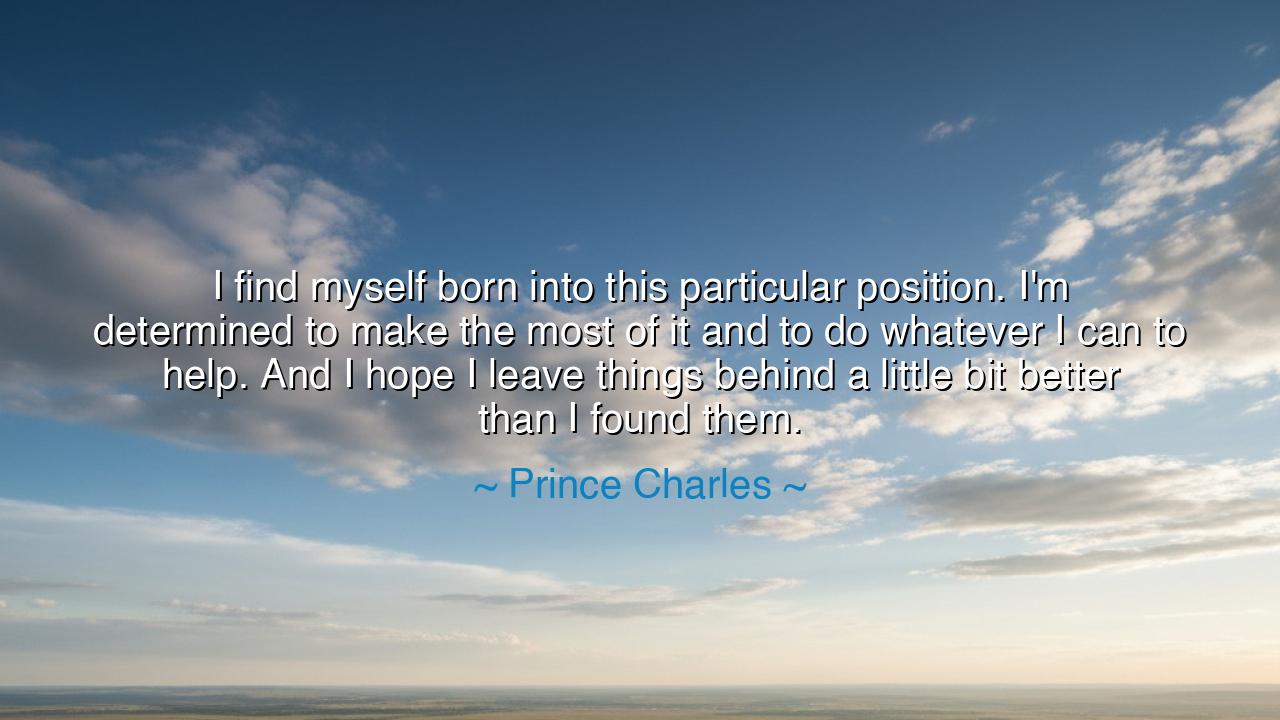
I find myself born into this particular position. I'm determined
I find myself born into this particular position. I'm determined to make the most of it and to do whatever I can to help. And I hope I leave things behind a little bit better than I found them.






“I find myself born into this particular position. I'm determined to make the most of it and to do whatever I can to help. And I hope I leave things behind a little bit better than I found them.” Thus spoke Prince Charles, now King Charles III, heir of a long and storied lineage. Yet within these humble words lies not the pride of a monarch, but the quiet strength of a servant. It is a declaration of duty, not dominion; of purpose, not privilege. In this simple utterance resounds the eternal truth that a man’s worth is not measured by the station into which he is born, but by how he serves within it.
From the moment of his birth, Charles did not choose his destiny — it was given to him, woven into his very being by blood and history. The crown, that ancient circle of gold, is not a prize but a burden, heavy with expectation. Yet he speaks not with resentment, but with resolve. “I’m determined to make the most of it,” he says — and in those words shines the spirit of the stoic, the one who accepts the lot given by fate and strives to turn it into a blessing for others. To “make the most of it” is the anthem of the wise; for life, whether high or low, royal or humble, is always a sacred trust, a chance to leave behind light where there was shadow.
Throughout his life, Prince Charles labored not for his own grandeur, but for the earth and its children. Long before the world spoke of climate change, he warned of the dangers of greed and neglect. He championed organic farming, sustainable living, and the protection of forests and oceans. Many mocked him for speaking to the plants and preaching to the indifferent, yet he continued — not for glory, but for conscience. Like an ancient guardian of the land, he knew that true nobility lies not in ruling over men, but in stewardship — in caring for the world entrusted to you. And thus his words became prophecy: “to leave things behind a little bit better than I found them.”
This philosophy is not for kings alone. It belongs to all who awaken each morning to the weight of responsibility — to parents guiding their children, to teachers shaping minds, to workers building the unseen foundations of society. Each of us, like Charles, is “born into a particular position,” whether of power or obscurity. Yet the sacred question remains the same: What will we do with what we have been given? The farmer has his field, the writer his page, the healer his hands — all bound by the same divine law of service. It is not the size of our influence, but the purity of our effort, that sanctifies our lives.
History is full of souls who understood this law. Consider George Washington, who, having led a nation to freedom, might have seized a crown but chose instead to lay it down, retiring to his farm at Mount Vernon. He, too, desired only to “leave things better than he found them.” Or think of Florence Nightingale, who turned the horrors of war into a mission of mercy, walking through the night with her lamp to tend to the wounded. She, like Charles, accepted her calling not as privilege but as purpose, proving that greatness is born from compassion.
To “help” — that small, unadorned word in Charles’s quote — carries the weight of eternity. It is the essence of all spiritual teaching: to help where one can, to mend what is broken, to build what endures. The one who helps adds to the strength of the world; the one who withholds weakens it. If every man and woman sought to leave their corner of existence a little better — a home cleaner, a heart kinder, a child wiser — then heaven itself would descend upon the earth.
Therefore, my child, take this teaching to heart. You may not wear a crown, but you wear the gift of life, and that is a kingdom all its own. Accept your place in the world not with envy nor shame, but with quiet determination. Make the most of it. Help where you can. Leave things better than you found them. This is the work of kings and of commoners alike. For in the end, the measure of a life is not the titles one bears, but the love one leaves behind — the small, enduring light that continues to shine long after the name has faded.






AAdministratorAdministrator
Welcome, honored guests. Please leave a comment, we will respond soon